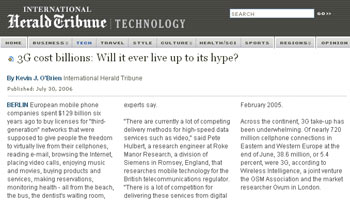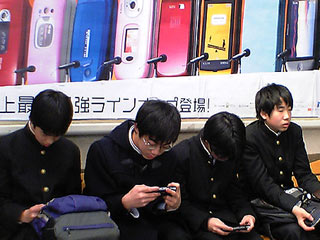Japan 3G Beats the Hype – Lessons for European Cellcos
 The International Herald Tribune ran a couple of gloomy 3G-related articles last week (see “3G cost billions: Will it ever live up to its hype?” and “Operators in Asia learn from mistakes”). It’s the height of the summer vacation slow-news cycle, and maybe the IHT was just fishing for some headline attention, but we couldn’t let these egregiously faulty items pass without comment.
The International Herald Tribune ran a couple of gloomy 3G-related articles last week (see “3G cost billions: Will it ever live up to its hype?” and “Operators in Asia learn from mistakes”). It’s the height of the summer vacation slow-news cycle, and maybe the IHT was just fishing for some headline attention, but we couldn’t let these egregiously faulty items pass without comment.
3G cost billions: Will it ever live up to its hype?
European mobile phone companies spent $129 billion six years ago to buy licenses for third-generation (3G) networks, which were supposed to give people the freedom to virtually live from their cell phones, reading email, browsing the Internet, placing video calls, enjoying music and movies, buying products and services, making reservations, monitoring health — all from the beach, the bus, the dentist’s waiting room or wherever they were.
But today, most people use their cell phones just as they did in 2000 — to make calls — and the modest gains 3G has made do not begin to justify the massive costs of the technology, which has strapped some mobile operators financially, bankrupted entrepreneurs, spurred multibillion-euro lawsuits against governments and phone companies, and sapped research spending.
Over the long term, 3G runs the risk of becoming the Edsel of the mobile phone industry — an expensive, unwanted albatross rejected by consumers and bypassed by other, less costly technologies, some experts say.
These articles are worse than merely wrong: they help fuel the flawed thinking and misguided strategies to which 3G license holders are addicted (helping cause the continued malaise). So widespread user apathy and risible revenues must prove that 3G’s a loser, right? Wrong. And to see why, you need look no further than Japan. Why have 3G carriers elsewhere in the world not realised: you don’t have to be DoCoMo to succeed like DoCoMo does.
WWJ paid subscribers: Log in for our 10-point rebuttal to the first IHT article (‘3G Hype’). Note: it’s a little long, so best to print out and read poolside!


 As mobile music settles into a steady mainstream
As mobile music settles into a steady mainstream